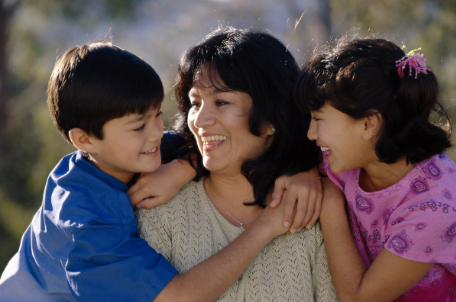I’m sure that many of you who read my previous blog on trust with relationships may be thinking, “This woman is officially obsessed with that concept.” And yes, I will say that this concept is important because it is the bedrock of any healthy relationship. But today, I want to focus this blog on one particular relationship: parent and child. Being a family therapist, I see how this relationship can be turned upside down and be toxic at times. But once I clear away all the mess of emotions, I see that one of the biggest problems that leads to the breakdown of this relationship comes from the mindset of, “I don’t trust you and I don’t respect you.” This can come from both sides of the relationship, but it always leads to a breakdown. It’s not uncommon for this mindset to lead to the child never coming back home after they move out, or the parents not communicating with the child for years. The question that we must answer is how do we build trust in this relationship?
First, we have to value our child as an important member of our lives. How do we do that? We show them through our actions, words, and time that they are important to us. This may mean that we may not be able to focus on our own personal goals for a while or get what we want. But at the end of the day the important thing is that we are showing our family member that they mean something to us. When people know that they are important to that individual, they will know that they can trust that person.

Second, respect from both parties, goes a long way. Note how I said both. Most parents tend to think that “My kids don’t really deserve my respect.” I’m inclined to disagree. Your children may not have the overall knowledge that comes with living life, but that doesn’t mean that they don’t know something. Also, it is our job as parents to teach them how to make good and informed decisions. This may mean that we have to actually take what our kids are saying and look for the value in it before disparaging it. We also make it a point to create a culture of respect in our homes at all times. We do not allow abusive or degrading behavior to even take route as a way of interacting with each other. This may mean that we have to be firm with our children when they are disrespectful, but it puts a safeguard for the future.
Third, model how you want your children to treat you and others. I think many parents will agree that their kids are always watching them at some point. And your kids will be able to smell a fake a mile away in terms of whether or not someone really cares. I’m a big believer in parents are the first and biggest teacher of any child’s life. We are responsible for teaching our children how to relate to other people, how to set boundaries, how to treat others with dignity and value, and how to show compassion. The biggest way that we teach is showing them what it looks like. Instead of treating our spouse with disdain, we treat them with the respect and dignity that they are due. We also model how we treat our friends, our family members who are really difficult to deal with, and we model how we respect governing authority.
Fourth, we make it a point to discipline. Now many of you may be wondering, “How could discipline possibly help with building trust.” Well believe it or not, kids crave structure! They may tell you in many ways that they don’t like rules or boundaries, but deep down inside they crave the safety and security that structure brings. Now there are many different debates on what methods of discipline are the most effective and the least harmful, but the simple goal of discipline is to teach your child right from wrong. This also teaches them that you care more about their overall well-being as an individual to the point where you will do the hard things in order to get them to that good place.
Finally, we admit that we aren’t perfect and be willing to say that we are wrong sometimes. I think the biggest reassurance that we can give our kids is the sense that we are not perfect, and we are willing to take responsibility to make things right when we get it wrong. Now I know that may hit some of you right where it hurts because who really likes to admit when they get it wrong? But admitting our faults can teach our kids to not always expect perfection out of us, and also teach them to be vulnerable around us. When we are vulnerable, it encourages our kids to do the same thing.
I’ve said it before and I’ll say it again, trust is essential for us to build strong relationships. It takes time and effort in order to build it, but the work is well worth it. If your children learn to trust you when they are children, then they will be willing to reach out to you when they are adults when they need it. I’m not going to say that this is easy, but it nothing every worth doing or building is.